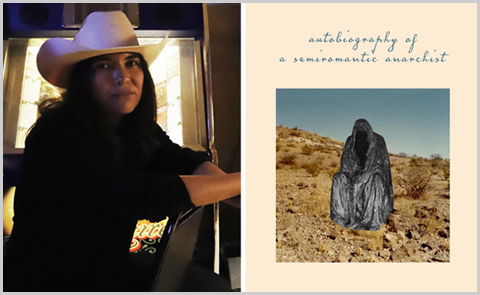Join us in celebrating the launch of mónica teresa ortiz’s new chapbook of crónicas, autobiography of a semi romantic anarchist (Host Publications).

I was really influenced by Eduardo Galeano’s work and then began reading Cameroon scholar Achille Mbembe’s On the Postcolony. The cronicas reflect my exploration of necropolitics, of the state and sovereignty, of trying to exist and survive in a space where queerness is a disruption, against heteronormativity, against heterosexuality, against whiteness, against the state which controls our lives, even what happens to our bodies after we die. I think it hinges on the concept of an afterlife. When I came out to my parents, the person that they knew me to be, no longer existed. I was treated as if I had died. I began thinking, is my queerness my afterlife? Is it a rebirth?
This is how I perceive queer futurity. As Jose Esteban Muñoz says, it is imagining a future that doesn’t exist yet.
We live in a colonized space under capitalism. Our lives and deaths happen within these parameters. The settler colonial state attempts to control how we experience love and loss and grief but it doesn’t have to define it.
mónica teresa ortiz is a poet born and raised in Texas. Her first poetry collection, muted blood, was published by Black Radish Books in 2018. ortiz is the poetry editor for Raspa Magazine, a Queer Latinx literary and art journal.
